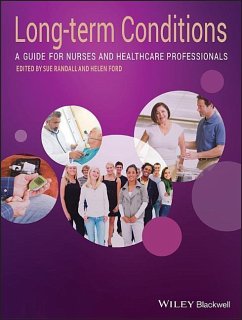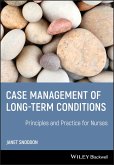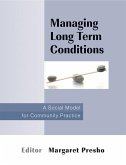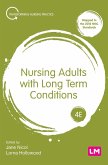Long-term Conditions A GUIDE FOR NURSES AND HEALTHCARE PROFESSIONALS Long-term Conditions is a comprehensive textbook for all nursing and health care students and practitioners, that explores the key issues surrounding caring for patients with chronic diseases or long-term conditions. Divided into three sections, this book explores living with a long-term condition; empowerment; and care management. Rather than being disease focused, it looks key issues and concepts which unify many different long-term conditions, including psychological and social issues that make up a considerable part of living with a long-term condition. Within each of the chapters, issues of policy, culture and ethics are intertwined, and case studies are used throughout, linking the concepts to specific diseases. KEY FEATURES * A comprehensive textbook on the principles and practice of caring for people with long-term conditions * User-friendly in style with learning outcomes, further reading, useful websites, and case studies throughout linking to specific conditions * Moves away from a disease focused medical model, and takes a needs-led approach * Uniquely explores the overarching issues of living with one or more long-term conditions * Focuses on the importance of multi-disciplinary team work and collaborative teamwork in the management of long-term conditions
"This text would be useful for students and practitionersnew to the role." (Primary Health Care, 1September 2012)
"All healthcare professionals who treat or care forpatients with long term conditions should read this book whetherthey are working in primary, secondary, tertiary care, for the NHS,a hospice, social services or a voluntaryorganisation." (Nursing Times, 13 September2012)Taking a partnership approach that is focused on key issues andconcepts in living with condition, rather than focusing on disease,Randall and Ford offer a textbook for nursing and healthcare practitioners that explores issues involved in the careof patients with chronic diseases conditions. (Book News, 2011)
Well organized and easy to read, with many case studies andadequate references... This book is notable for its focus on theimportance of a teamwork approach to care for individuals who livewith a chronic condition. It also emphasizes the continuity of caremodel in order to set the framework of care delivery. It is awonderful tool for care coordinators or careproviders. (Doodys, October 2011)
Well structured, attractively presented andeasy-to-follow...full of useful information and through-provokingideas (Emergency Nurse, November 2011)
This excellent book takes a needs-led approach. I particularlyliked the points for reflection that encourage readers to develotheir own practice to improve patient experience. (Nursing OlderPeople, December 2011)
5*. This comprehensive text explores key concents with clearexplanations, diagrams and case studies. I recommend it to newlyqualified and experienced nurses, as well as nursing students.(Nursing Standard, October 2011)
"All healthcare professionals who treat or care forpatients with long term conditions should read this book whetherthey are working in primary, secondary, tertiary care, for the NHS,a hospice, social services or a voluntaryorganisation." (Nursing Times, 13 September2012)Taking a partnership approach that is focused on key issues andconcepts in living with condition, rather than focusing on disease,Randall and Ford offer a textbook for nursing and healthcare practitioners that explores issues involved in the careof patients with chronic diseases conditions. (Book News, 2011)
Well organized and easy to read, with many case studies andadequate references... This book is notable for its focus on theimportance of a teamwork approach to care for individuals who livewith a chronic condition. It also emphasizes the continuity of caremodel in order to set the framework of care delivery. It is awonderful tool for care coordinators or careproviders. (Doodys, October 2011)
Well structured, attractively presented andeasy-to-follow...full of useful information and through-provokingideas (Emergency Nurse, November 2011)
This excellent book takes a needs-led approach. I particularlyliked the points for reflection that encourage readers to develotheir own practice to improve patient experience. (Nursing OlderPeople, December 2011)
5*. This comprehensive text explores key concents with clearexplanations, diagrams and case studies. I recommend it to newlyqualified and experienced nurses, as well as nursing students.(Nursing Standard, October 2011)








